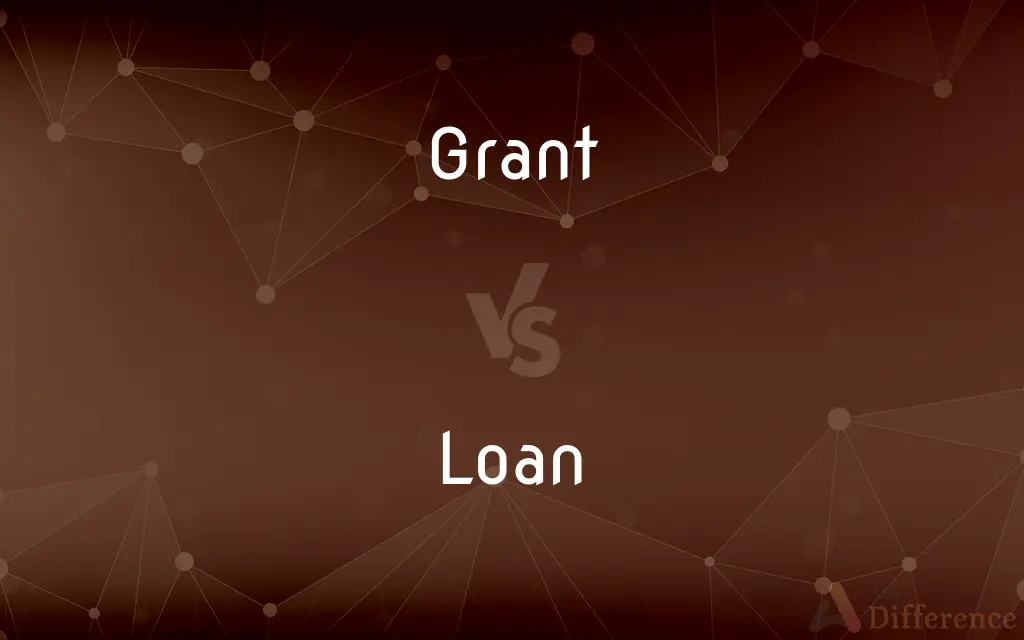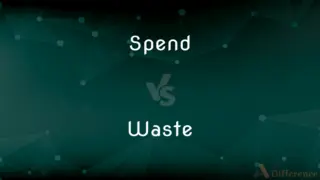Grant vs. Loan — What's the Difference?
Edited by Tayyaba Rehman — By Fiza Rafique — Updated on March 21, 2024
A grant is non-repayable funds provided, often for specific purposes, while a loan is borrowed money that must be repaid, usually with interest.

Difference Between Grant and Loan
Table of Contents
ADVERTISEMENT
Key Differences
A grant is a sum of money given by an organization, often government or charitable, for a particular purpose, such as education, research, or business development. It does not require repayment, making it a desirable form of financial assistance. On the other hand, a loan is an amount of money lent to an individual or business with the expectation that it will be repaid, typically with interest, over a predetermined period.
Grants are often awarded based on need, merit, or project proposal, with specific conditions on how the money is to be used. They are common in academic, scientific research, and non-profit sectors. In contrast, loans are more broadly accessible and can be used for a variety of purposes, including personal finance, education, home buying, and business expansion. The terms of a loan, including interest rates and repayment schedules, vary widely depending on the lender and the borrower's creditworthiness.
One of the main attractions of grants is that they provide financial support without the burden of repayment, making them especially beneficial for non-profit organizations, students, and researchers. Loans, however, are a form of debt and carry the risk of financial strain if not managed properly, but they are more universally available and can provide larger amounts of funding.
The application process for grants can be highly competitive and requires detailed proposals, justifying the need and outlining how the funds will be used. Loan applications, while also requiring documentation of financial status and creditworthiness, are generally more straightforward and focused on the borrower's ability to repay.
The choice between seeking a grant or a loan depends on the individual's or organization's needs, the purpose of the funds, and the ability to meet the obligations associated with each option. While grants are ideal for funding specific projects or needs without the worry of repayment, loans offer more flexibility and immediacy of funds, albeit with the responsibility of repayment.
ADVERTISEMENT
Comparison Chart
Repayment
Not required
Required, usually with interest
Purpose
Specific projects or needs, such as education or research
Various, including personal, educational, business, or home buying
Source
Governments, foundations, charities
Banks, financial institutions, government programs
Application
Often competitive, requiring detailed proposals
Requires financial and credit evaluation, less emphasis on project specifics
Benefit
No financial burden of repayment
Larger amounts and broader usage possibilities
Compare with Definitions
Grant
Non-repayable financial aid.
She received a grant for her environmental research project.
Loan
Borrowed money that must be repaid with interest.
He took out a loan to buy a new car.
Grant
Provided by organizations or governments.
The government grant supported small businesses during the downturn.
Loan
Accessible through banks and financial institutions.
The startup obtained a loan from a local bank.
Grant
Often for specific purposes.
The grant was allocated for developing community arts programs.
Loan
Can be used for a wide range of purposes.
They secured a home improvement loan for renovations.
Grant
Application involves proposals or demonstrations of need.
The grant application required a detailed project proposal.
Loan
Repayment terms and interest rates vary.
The loan had a favorable interest rate and flexible repayment terms.
Grant
Particularly beneficial for non-profits and education.
The museum operated on grants and donations.
Loan
Requires creditworthiness assessment.
Her excellent credit score qualified her for a low-interest loan.
Grant
To allow or consent to the fulfillment of (something requested)
Grant permission to speak frankly.
Grant a request.
Loan
In finance, a loan is the lending of money by one or more individuals, organizations, or other entities to other individuals, organizations etc. The recipient (i.e., the borrower) incurs a debt and is usually liable to pay interest on that debt until it is repaid as well as to repay the principal amount borrowed.
Grant
To give or confer officially or formally
Grant voting rights to citizens.
Grant diplomatic immunity.
Loan
An instance of lending
A bank that makes loans to small businesses.
Grant
To transfer (property) by a deed.
Loan
A sum of money that is lent, usually with an interest fee
Took out a loan to buy a car.
Repaid the loan over five years.
Grant
To concede; acknowledge
I grant that your plan is ingenious, but you still will not find many backers.
Loan
The agreement or contract specifying the terms and conditions of the repayment of such a sum.
Grant
The act of granting.
Loan
The repayment obligation associated with such an agreement
She couldn't afford the loan after losing her job.
Grant
Something granted, especially a giving of funds for a specific purpose
Federal grants for medical research.
Loan
The right to payment associated with such an agreement
A bank that buys consumer loans.
Grant
The document or provision in a document by which a grant is made.
Loan
The state of being lent for temporary use
A painting on loan from another museum.
Grant
One of several tracts of land in New Hampshire, Maine, and Vermont originally granted to an individual or a group.
Loan
To lend (money or property).
Grant
(ditransitive) to give (permission or wish)
He was granted permission to attend the meeting.
The genie granted him three wishes
Loan
An act or instance of lending, an act or instance of granting something for temporary use.
Because of the loan that John made to me, I was able to pay my tuition for the upcoming semester.
Grant
(ditransitive) To bestow or confer, with or without compensation, particularly in answer to prayer or request; to give.en
Loan
A sum of money or other property that a natural or legal person borrows from another with the condition that it be returned or repaid over time or at a later date (sometimes with interest).
All loans from the library, whether books or audio material, must be returned within two weeks.
He got a loan of five thousand pounds.
Grant
(transitive) To agree with (someone) on (something); to accept (something) for the sake of argument; to admit to (someone) that (something) is true.
Loan
The contract and array of legal or ethical obligations surrounding a loan.
He made a payment on his loan.
Grant
(intransitive) To assent; to consent.
Loan
The permission to borrow any item.
Thank you for the loan of your lawn mower.
Grant
The act of granting; a bestowing or conferring; concession; allowance; permission.
Loan
(Scotland) A lonnen.
Grant
The yielding or admission of something in dispute.
Loan
To lend (something) to (someone).
Grant
The thing or property granted; a gift; a boon.
I got a grant from the government to study archeology in Egypt.
Loan
A loanin.
Grant
(law) A transfer of property by deed or writing; especially, an appropriation or conveyance made by the government.
A grant of land or of money
Loan
The act of lending; a lending; permission to use; as, the loan of a book, money, services.
Grant
The deed or writing by which such a transfer is made.
Loan
That which one lends or borrows, especially a sum of money lent at interest; as, he repaid the loan.
Grant
(informal) An application for a grant monetary boon to aid research or the like.
Loan
To lend; - sometimes with out.
By way of location or loaning them out.
Grant
To give over; to make conveyance of; to give the possession or title of; to convey; - usually in answer to petition.
Grant me the place of this threshing floor.
Loan
The temporary provision of money (usually at interest)
Grant
To bestow or confer, with or without compensation, particularly in answer to prayer or request; to give.
Wherefore did God grant me my request.
Loan
A word borrowed from another language; e.g. `blitz' is a German word borrowed into modern English
Grant
To admit as true what is not yet satisfactorily proved; to yield belief to; to allow; to yield; to concede.
Grant that the Fates have firmed by their decree.
Loan
Give temporarily; let have for a limited time;
I will lend you my car
Loan me some money
Grant
To assent; to consent.
Grant
The act of granting; a bestowing or conferring; concession; allowance; permission.
Grant
The yielding or admission of something in dispute.
Grant
The thing or property granted; a gift; a boon.
Grant
A transfer of property by deed or writing; especially, an appropriation or conveyance made by the government; as, a grant of land or of money; also, the deed or writing by which the transfer is made.
Grant
Any monetary aid
Grant
The act of providing a subsidy
Grant
(law) a transfer of property by deed of conveyance
Grant
Scottish painter; cousin of Lytton Strachey and member of the Bloomsbury Group (1885-1978)
Grant
United States actor (born in England) who was the elegant leading man in many films (1904-1986)
Grant
18th President of the United States; commander of the Union armies in the American Civil War (1822-1885)
Grant
A contract granting the right to operate a subsidiary business;
He got the beer concession at the ball park
Grant
A right or privilege that has been granted
Grant
Let have;
Grant permission
Mandela was allowed few visitors in prison
Grant
Give on the basis of merit;
Funds are granted to qualified researchers
Grant
Be willing to concede;
I grant you this much
Grant
Allow to have;
Grant a privilege
Grant
Bestow, especially officially;
Grant a degree
Give a divorce
This bill grants us new rights
Grant
Give over; surrender or relinquish to the physical control of another
Grant
Transfer by deed;
Grant land
Common Curiosities
What is the key difference between a grant and a loan?
The key difference is that grants do not require repayment, whereas loans must be repaid, usually with interest.
Are loans always associated with interest?
Yes, loans typically come with interest, which is the cost of borrowing the money.
What is the main benefit of a grant?
The main benefit is financial support without the obligation to repay, making it ideal for funding specific projects or needs.
Can anyone apply for a grant?
While anyone can apply, grants are typically awarded based on specific criteria such as need, merit, or project proposals.
Do grants have to be used for specific purposes?
Yes, grants are usually designated for specific projects or needs and come with stipulations on how the funds are to be used.
Can businesses receive grants?
Yes, businesses, particularly startups and non-profits, can receive grants for specific projects, research, or development efforts.
Is it easier to get a loan or a grant?
Loans are generally more accessible to a broader audience, but obtaining a grant can be competitive and requires meeting specific criteria.
What happens if you don't repay a loan?
Failure to repay a loan can lead to legal action, damage to credit scores, and potential loss of assets if the loan is secured.
Can grants cover personal expenses?
Some grants, especially in education, can cover personal expenses related to the purpose of the grant, such as living costs for students.
What is the advantage of a loan over a grant?
Loans offer more flexibility in terms of the amount of money available and how it can be used, although they come with the responsibility of repayment.
Share Your Discovery

Previous Comparison
Tardy vs. Delayed
Next Comparison
Spend vs. WasteAuthor Spotlight
Written by
Fiza RafiqueFiza Rafique is a skilled content writer at AskDifference.com, where she meticulously refines and enhances written pieces. Drawing from her vast editorial expertise, Fiza ensures clarity, accuracy, and precision in every article. Passionate about language, she continually seeks to elevate the quality of content for readers worldwide.
Edited by
Tayyaba RehmanTayyaba Rehman is a distinguished writer, currently serving as a primary contributor to askdifference.com. As a researcher in semantics and etymology, Tayyaba's passion for the complexity of languages and their distinctions has found a perfect home on the platform. Tayyaba delves into the intricacies of language, distinguishing between commonly confused words and phrases, thereby providing clarity for readers worldwide.















































